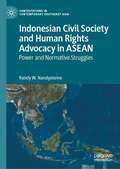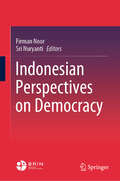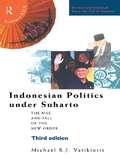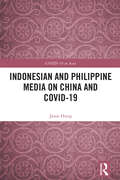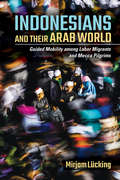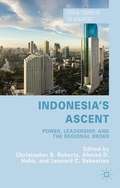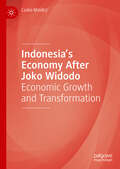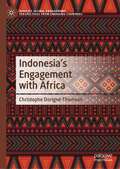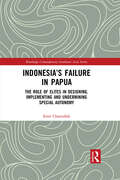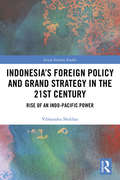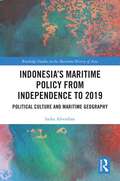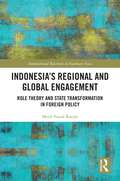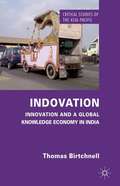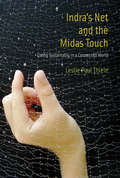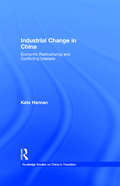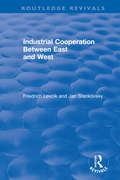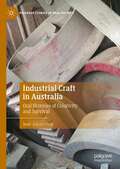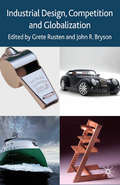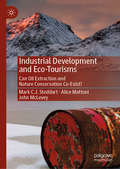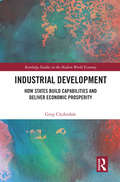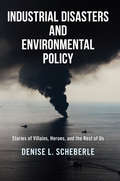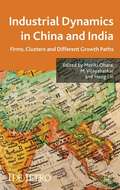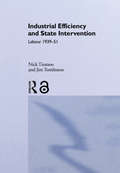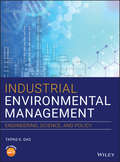- Table View
- List View
Indonesian Civil Society and Human Rights Advocacy in ASEAN: Power and Normative Struggles (Contestations in Contemporary Southeast Asia)
by Randy W. NandyatamaThis book focuses on how Indonesian civil society organisations interact with ASEAN to shape human rights institutionalisation in the region. Using Bourdieu-inspired constructivist IR as an analytical lens, the book argues that there are pre-reflexive norms that dominate the field of interaction in the region that shape the way civil society organisations operate. This has resulted in the diverging advocacy practices, thus complicating human rights institutionalisation process in ASEAN.
Indonesian Perspectives on Democracy
by Firman Noor Sri NuryantiThis book discusses the extent to which Indonesia's trajectory to democracy has changed its direction toward democratic consolidation. In the case of democratic decline in Indonesia, there are numerous studies conducted in order to explain the challenges facing democratization. However, not many of them demonstrate the existing precursors and symptoms of democratic decline, which this book confronts. The authors unpack the problems that continue to hinder Indonesia's path to democratic consolidation and show that against this decline, Indonesia has experienced a new phase of its democratic life during, and in the immediate aftermath of, the COVID-19 pandemic, whereby the political ecosystem has seen a strengthening of the role of the state. This has, in fact, further complicated Indonesia's democratic transition. This book explains how these challenges impact Indonesia’s trajectory to democracy, drawing from three important approaches of democratic regime studies, encompassing actors, institutions, and norms. These aspects are elaborated upon in relation to various issues facing the country, thus capturing a sweeping picture of the political struggles preventing democratic growth. Relevant to researchers and students studying countries in democratic transition, but particularly the case of Indonesia, this is a novel contribution to understanding the country's developing political landscape.
Indonesian Politics Under Suharto: The Rise and Fall of the New Order (Politics in Asia)
by Michael R VatikiotisThis revised third edition provides an analysis of Suharto's New Order from its inception to the emergence of B.J. Habibie as President. The author reassesses the New Order's origins and its military roots and evaluates the considerable economic changes that have taken place since the 1960s. He examines Suharto's politics and, in a new chapter, the reasons behind the crisis and Suharto's fall.
Indonesian and Philippine Media on China and COVID-19 (COVID-19 in Asia)
by Jason HungThis book studies Indonesian and Philippine English-language printed media outlets to examine how regional public opinions of China and China-made vaccines progressed amid the coronavirus pandemic. By quantifying the presence of certain words, themes, and concepts within the qualitative, textual data of news articles from the most prominent English newspapers in Indonesia (i.e. The Jakarta Post) and the Philippines (i.e. The Philippine Daily Inquirer), the book investigates the trajectories of the regional narratives on Chinese vaccines, Beijing, and China. Through this same methodology, the book also explores indications of the degree of soft power exerted by Beijing through such media outlets in both Indonesia and the Philippines. Analysing how Sino-Southeast Asian relations changed during the COVID-19 pandemic, this book will be a valuable resource to students and scholars of international relations, media studies, and Asian politics.
Indonesians and Their Arab World: Guided Mobility among Labor Migrants and Mecca Pilgrims
by Mirjam LückingIndonesians and Their Arab World explores the ways contemporary Indonesians understand their relationship to the Arab world. Despite being home to the largest Muslim population in the world, Indonesia exists on the periphery of an Islamic world centered around the Arabian Peninsula. Mirjam Lücking approaches the problem of interpreting the current conservative turn in Indonesian Islam by considering the ways personal relationships, public discourse, and matters of religious self-understanding guide two groups of Indonesians who actually travel to the Arabian Peninsula—labor migrants and Mecca pilgrims—in becoming physically mobile and making their mobility meaningful. This concept, which Lücking calls "guided mobility," reveals that changes in Indonesian Islamic traditions are grounded in domestic social constellations and calls claims of outward Arab influence in Indonesia into question. With three levels of comparison (urban and rural areas, Madura and Central Java, and migrants and pilgrims), this ethnographic case study foregrounds how different regional and socioeconomic contexts determine Indonesians' various engagements with the Arab world.
Indonesia’s Ascent
by Christopher B. Roberts Ahmad D. Habir Leonard C. SebastianThis volume explores the domestic and transnational considerations associated with Indonesia's ascent, referring to its rise in terms of hard and soft power and its likely trajectory in the future. The range of contributors analyse economic resources, religious harmony, security, regional relations, leadership and foreign policy.
Indonesia’s Economy After Joko Widodo: Economic Growth and Transformation
by Csaba MoldiczThis book examines the transformation of the Indonesian economy during the presidency of Joko Widodo and the economic policies that have underpinned it, with a particular focus on manufacturing, services and infrastructure development. It not only assesses the current social and economic conditions within Indonesia, but also explores Indonesia's place within the global economy and the important role it will play in the future, particularly with regard to global supply chains. The need to balance technological modernization and capital investment with economic and strategic autonomy is also discussed. This book outlines Indonesia's economic development in recent years and considers the country's potential for further development in the coming years. It will be relevant to researchers and policymakers interested in development economics and economic policy.
Indonesia’s Engagement with Africa (Africa's Global Engagement: Perspectives from Emerging Countries)
by Christophe Dorigné-ThomsonThis book provides a comprehensive study of Indonesia's contemporary foreign policy engagement with Africa, highlighting the archipelago’s recent reawakening to the continent. It explores thoughts on Afro-Asian relations in general and their future in the changing geopolitical context. It provides a vision of Indonesia’s foreign policy and political situation at the highest level of leadership. It places Indonesia in a multi-comparison context, which helps us reconsider Indonesia today and widens our views on Indonesia’s needs to be better known through new perspectives and voices able to better convey the realities of its polity, aspirations, and complexities. It proposes, through the study of Indonesia’s African endeavour, to better grasp the contemporary Indonesian Zeitgeist and Weltanschauung. It also analyses the political power alliance formed by President Jokowi and former General Luhut Binsar Pandjaitan, leading a state-led development through state capitalism, mobilising State-Owned Enterprises (SOEs). The Bandung Conference host aspires to project its domestic development achievements towards Africa, focusing on Africa for Africa and not merely as part of a sometimes-abstract Afro-Asian discourse. Nonetheless, Afro-Asianism continues to be mobilised to facilitate market penetration and serve domestic interests. The book shows how Indonesia’s foreign policy toward Africa relates to domestic political contestation and consolidation, political legacy and commodity-based industrial policy, and Chinese and “China in Africa” networks and ideational influence, foremost among other networks of influence in the Jokowi era. The book also underlines how Indonesia’s knowledge production and academic deficiencies negatively impact its foreign policy capabilities, notably as a potential robust alternative partner for Africa. It will be beneficial for students, academicians, researchers, and diplomats.
Indonesia’s Failure in Papua: The Role of Elites in Designing, Implementing and Undermining Special Autonomy
by Emir ChairullahChairullah investigates how the political, social, and economic interests of national and local elites were negotiated in the formulation and early stages of Special Autonomy in Papua Province, Indonesia. The Papuan case lends support to the current conception of elite theory, which considers the influence of actors and dynamics beyond power elites in the decision-making process. The failure of the policy implementation as a conflict reduction strategy in the Papuan case can be attributed to the dynamics of elite configurations during the negotiation and early implementation stages. Chairullah presents two significant new findings for research on Papuan Special Autonomy. Firstly, that secret negotiations were held between Papuan and national elites during Abdurrahman Wahid’s presidency, and these were crucial in reducing separatist sentiment in Papua. Secondly, that the United States, through Freeport McMoRan, strongly influenced the Special Autonomy negotiation process. The actions of national elites in Jakarta led to widespread disappointment about the policy at all levels in Papua and the subsequent escalation of separatist sentiment based on Papuan ethnic identity. An important book for scholars of Indonesian politics and society, and especially those with a particular interest in the Papuan conflict.
Indonesia’s Foreign Policy and Grand Strategy in the 21st Century: Rise of an Indo-Pacific Power (Asian Security Studies)
by Vibhanshu ShekharThis book examines the changes in Indonesian foreign policy during the 21st century as it seeks to position itself as a great power in the Indo-Pacific region. The rise of 21st-century Indonesia is becoming a permanent fixture in both the domestic and global discourses. Though there has been an increasing level of discussion on Indonesia’s emerging power status, there has been little discussion on how the country is debating and signalling its new-found status. This book combines the insights of both neo-classical realism and social identity theory to discuss a reset in an emerging Indonesia’s foreign policy during the 21st century while emphasizing domestic drivers and constraints of its international behaviour. There are three key organizing components of the book – emerging power, status signalling and the Indo-Pacific region. The Indo-Pacific region constitutes a spatial framing of the book; the emerging power provides an analytical category to explain Indonesia’s changing international status; and status signalling explains multiple facets of international behaviour through which the country is projecting its new status. Though leaders are adding different styles and characteristics to the rising Indonesia narrative, there are a few unmistakable overarching trends that highlight an increasing correlation between the country’s rising power and growing ambition in international behaviour. This book is built around four key signalling strategies of Indonesia as an emerging power – expanded regional canvas, power projection, leadership projection, and quest for great power parity. They represent Indonesia’s growing desire for a status-consistent behaviour, its response to the prevailing strategic uncertainty in the Indo-Pacific region and its attempt to advance its strategic interests. This book will be of much interest to students of South-East Asian politics, strategic studies, international diplomacy, security studies and IR in general.
Indonesia’s Maritime Policy from Independence to 2019: Political Culture and Maritime Geography (Routledge Studies in the Maritime History of Asia)
by Indra AlverdianAlverdian explores how a distinct national character of maritime governance has influenced the nature of Indonesia's aspiration to go beyond archipelagic towards a maritime nation, through focusing on the intersection between the nation's political culture, historical changes and geopolitical contexts, which gave rise to the primacy of the theme of unity in the nation's discourse.The main theme of this research is the three-pillar framework of the Tanah-Air concept, which includes the political culture of persatuan nasional (national unity), the strategic culture of cakra manggilingan (turning of the times from dark to golden periods), and the geopolitical context of posisi silang dunia (world crossroad position). The findings of this publication indicate the dominant influence of Javanese political culture, philosophy, values, and traditions on the distinct character of Indonesia’s maritime orientation. Specifically, Javanese political philosophy and traditions within each pillar of Tanah-Air have influenced continuity rather than change in the evolution of Indonesia’s maritime policy. This book helps readers understand how the defining theme of unity in national political culture has shaped the evolution of Indonesia’s maritime policy from 1945 to 2019. It illustrates how the continuous influence of the theme of national unity as devised by the political elites through history has addressed the realities of the archipelago’s geography, and it is significant from both an academic and practical policy perspective.A book designed for academics and the general public interested in gaining greater insight and knowledge on Indonesia’s maritime policy and maritime nation aspirations.
Indonesia’s Regional and Global Engagement: Role Theory and State Transformation in Foreign Policy (International Relations in Southeast Asia)
by Moch Faisal KarimKarim examines the changes and continuity of Indonesia’s foreign policy in the post-authoritarian era, under presidents Susilo Bambang Yudhoyono and Joko Widodo. Indonesia conceptualised and aimed to adopt four principle roles after 2004 – being a voice for developing countries; being a regional leader; being an advocate for democratic and human rights; and being a bridge-builder. These roles, however, were by no means stable and were constantly being negotiated and contested. Karim analyses the contested nature of Indonesian foreign policy and the limits this places on consistency in enacting these roles. He highlights two drivers for such limitations – conflicting role conceptions and state fragmentation. He develops this argument based on four case studies of Indonesia’s engagement in human rights governance and trade governance at both regional and global levels. Essential reading for students and scholars of Indonesia’s foreign policy, that will also be of substantial value to those studying policy in Southeast Asia more broadly.
Indovation
by Thomas BirtchnellHow should we understand the many reports that poverty is the mother of innovation in India? What has the role of austerity been in the development of India's knowledge economy? In this critical study of Indian innovation, or 'Indovation', Thomas Birtchnell explores how the complex mobilities of 'globals' with stakes in India have transformed discourses and imaginaries about innovation in the region. He adopts a critical eye to the notion of Indovation by focusing on the various circuits of globals where India's knowledge economy is concentrated: expertise, entrepreneurship and community. Birtchnell traces the various discourses and counter-discourses around an Indian way of working and illustrates how differences in the international dimensions of austerity allow India's knowledge economy to prosper.
Indra's Net and the Midas Touch: Living Sustainably in a Connected World
by Leslie Paul ThieleAn exploration of the impact of unintended consequences in an interdependent world and of the opportunities for creativity and community.We live today in a global web of interdependence, connected technologically, economically, politically, and socially. As a result of these expanding and deepening interdependencies, it has become impossible fully to control—or foretell—the effects of our actions. The world is rife with unintended consequences. The first law of human ecology—which declares that we can never do merely one thing—is a truth we ignore at our peril. In Indra's Net and the Midas Touch, Leslie Paul Thiele explores the impact of interdependence and unintended consequences on our pursuit of sustainability. Unfortunately, good intentions provide no antidote to the law of unintended consequences, and proffered cures often prove worse than the disease. Biofuels developed for the purpose of reducing carbon emissions, for example, have had the unintended effect of cutting off food supplies to the needy and destroying rain forests. We must fundamentally transform our patterns of thinking and behavior. Thiele offers the intellectual and moral foundations for this transformation, drawing from ecology, ethics, technology, economics, politics, psychology, physics, and metaphysics. Awareness of our interconnectedness, he writes, stimulates creativity and community; it is a profound responsibility and a blessing beyond measure.
Industrial Change in China: Economic Restructuring and Conflicting Interests (Routledge Studies on China in Transition #Vol. 4)
by Kate HannanThis book analyses the industrial reform measures taken by the Chinese government during the decade 1985-95 and identifies the economic and political tensions and contradictions that state enterprise reform has presented to a leadership intent on maintaining its authoritative political position.Using government sources and interviews with economists and workers at one of China's largest state-owned enterprises (The Second Automobile/Dongfeng corporation ), Hannan concludes that the relationship between state policy and enterprise is a complex two-way process characterised by tensions resulting from conflicting priorities.
Industrial Cooperation between East and West
by Friedrich Levcik Jan StankovskyThis title was first published in 1979. A number of valuable and interesting publications have appeared in the last few years on East-West cooperation. These studies, which by means of interviews and direct contacts with the firms concerned have shed some light on a subject that in the past had remained little known, also provided us with extremely valuable incentives. Most of these studies dealt only with individual aspects of cooperation, particularly the legal and microeconomic aspects. The quantitative data used, however, did not easily lend themselves to comparison. Eastern European studies more often contained the views of the respective governments than the experiences of enterp rises involved in cooperative undertakings. In this book the authors have attempted to provide a unified picture of the most important problems of East-West cooperation. The motivations and goals of those concerned, in all their m icroeconomic, macroeconomic, commercial, and political aspects, are brought together with the pertinent legal and institutional factors and are analyzed.
Industrial Craft in Australia: Oral Histories of Creativity and Survival (Palgrave Studies in Oral History)
by Jesse Adams SteinThis book is the first of its kind to investigate the ongoing significance of industrial craft in deindustrialising places such as Australia. Providing an alternative to the nostalgic trope of the redundant factory ‘craftsman’, this book introduces the intriguing and little-known trade of engineering patternmaking, where objects are brought to life through the handmade ‘originals’ required for mass production.Drawing on oral histories collected by the author, this book highlights the experiences of industrial craftspeople in Australian manufacturing, as they navigate precarious employment, retraining, gendered career pathways, creative expression and technological change. The book argues that digital fabrication technologies may modify or transform industrial craft, but should not obliterate it. Industrial craft is about more than the rudimentary production of everyday objects: it is about human creativity, material knowledge and meaningful work, and it will be key to human survival in the troubled times ahead.
Industrial Design, Competition and Globalization
by Grete Rusten John R. BrysonEconomic activities are becoming increasingly globalised. One result being that for companies in developed market economies price-based competition is being replaced or supplemented by other forms of competitiveness. This book explores the shift towards design-based competitiveness and the escalation in the design-intensity of goods and services.
Industrial Development and Eco-Tourisms: Can Oil Extraction and Nature Conservation Co-Exist?
by Alice Mattoni Mark C.J. Stoddart John McLeveyThis book examines the “oil-tourism interface”, the broad range of direct and indirect contact points between offshore oil extraction and nature-based tourism. Offshore oil extraction and nature-based tourism are pursued as development paths across the North Atlantic region. Offshore oil promises economic benefits from employment and royalty payments to host societies, but is based on fossil fuel-intensive resource extraction. Nature-based tourism, instead, is based on experiencing natural environments and encountering wildlife, including whales, seals, or seabirds. They share social-ecological space, such as oceans, coastlines, cities and towns where tourism and offshore oil operations and offices are located. However, they rarely share cultural or political space, in terms of media coverage, public debate, or policy discussion that integrates both modes of development. Through a comparative analysis of Denmark, Iceland, Newfoundland and Labrador, Norway, and Scotland, this book offers important lessons for how coastal societies can better navigate relationships between resource extraction and nature-based tourism in the interests of social-ecological wellbeing.
Industrial Development: How States Build Capabilities and Deliver Economic Prosperity (Routledge Studies in the Modern World Economy)
by Greg ClydesdaleGovernments are regularly judged by their ability to deliver economic prosperity, however many policies fail to deliver their desired outcomes. Industrial Development examines historical examples of how governments have attempted to build productive capabilities and promote industrial learning. Each chapter shows a different way in which this is done whether it is imitating existing production technologies, building new advanced technologies, tapping into existing global chains or building their own value chains. The book looks at a wide spectrum of countries and industries from Silicon Valley to the early Asian model of building domestic industries. The book also reveals that academics and policy makers can be a major source of policy failure. This book makes an important contribution to our understanding of capability building, industrial development and economic growth and will be an essential reading for economists, policy makers and government officials making policy in a global economy.
Industrial Disasters and Environmental Policy: Stories of Villains, Heroes, and the Rest of Us
by Denise L. ScheberleEnvironmental stories have all the elements of a good drama—villains that plunge the world into danger and heroes that fight for positive change. Industrial Disasters and Environmental Policy: Stories of Villains, Heroes, and the Rest of Us illuminates the interplay between environmental policies and the people and groups who influence their development and implementation. Through the stories of four major industrial disasters—the Union Carbide plant explosion, the BP oil spill, the Upper Big Branch Mine explosion, and the asbestos poisoning in Libby, Montana—this book examines the organizational breakdowns and regulatory lapses that caused these disasters, and how attitudes and policies changed as a result. It also explores the achievements of environmental heroes like Gaylord Nelson and Judy Bonds and how their activism has shaped US environmental politics and policies. Industrial Disasters and Environmental Policy concludes with a discussion of how the "rest of us" can participate in everyday environmental actions, hold corporations and the government accountable, and lobby for greater environmental protections. With its compelling stories and calls to action, this book helps students understand how US environmental policies have developed and transformed—and how they can continue to do so.
Industrial Dynamics in China and India
by Moriki Ohara M. Vijayabaskar Hong LinThis book is one of the first fully-fledged studies to examine the next world-class industrial leaders emerging from China and India; exploring the domestic and international factors that have led to their rise, and comparing their experiences with other East Asian late-comers such as Japan.
Industrial Eden
by Brett SheehanThis study of the evolution of Chinese capitalism chronicles the Song family of North China under five successive authoritarian governments. Brett Sheehan shows both foreign and Chinese influences on private business, which, although closely linked to the state, was neither a handmaiden to authoritarianism nor a natural ally of democracy.
Industrial Efficiency and State Intervention: Labour 1939-1951
by Jim Tomlinson Nick Tiratsoo Dr Nick TiratsooNick Tiratsoo and Jim Tomlinson describe and assess the Labour Party's development of a policy of improving industrial efficiency. They concentrate on the debates and initiatives of the wartime period and subsequent implementation of policy under Attlee.The book modifies existing historiography in two ways - it shows that the Labour Party of 1945-51 was concerned mainly with industrial modernization, not with creating the Welfare State, and it tackles the consequently necessary re-evaluation of wider theories about Britain's economic decline.
Industrial Environmental Management: Engineering, Science, and Policy
by Tapas K. DasProvides aspiring engineers with pertinent information and technological methodologies on how best to manage industry's modern-day environment concerns This book explains why industrial environmental management is important to human environmental interactions and describes what the physical, economic, social, and technological constraints to achieving the goal of a sustainable environment are. It emphasizes recent progress in life-cycle sustainable design, applying green engineering principles and the concept of Zero Effect Zero Defect to minimize wastes and discharges from various manufacturing facilities. Its goal is to educate engineers on how to obtain an optimum balance between environmental protections, while allowing humans to maintain an acceptable quality of life. Industrial Environmental Management: Engineering, Science, and Policy covers topics such as industrial wastes, life cycle sustainable design, lean manufacturing, international environmental regulations, and the assessment and management of health and environmental risks. The book also looks at the economics of manufacturing pollution prevention; how eco-industrial parks and process intensification will help minimize waste; and the application of green manufacturing principles in order to minimize wastes and discharges from manufacturing facilities. Provides end-of-chapter questions along with a solutions manual for adopting professors Covers a wide range of interdisciplinary areas that makes it suitable for different branches of engineering such as wastewater management and treatment; pollutant sampling; health risk assessment; waste minimization; lean manufacturing; and regulatory information Shows how industrial environmental management is connected to areas like sustainable engineering, sustainable manufacturing, social policy, and more Contains theory, applications, and real-world problems along with their solutions Details waste recovery systems Industrial Environmental Management: Engineering, Science, and Policy is an ideal textbook for junior and senior level students in multidisciplinary engineering fields such as chemical, civil, environmental, and petroleum engineering. It will appeal to practicing engineers seeking information about sustainable design principles and methodology.
